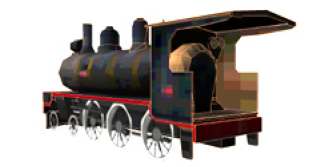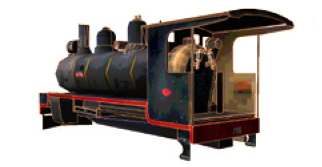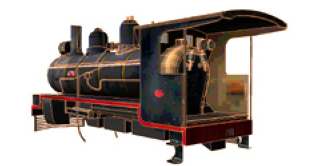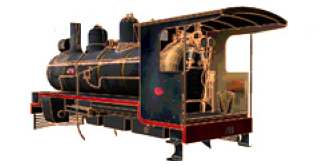LM.txt file
m (correct some config.txt formatting in the example extract) |
m (Remove reference to TRS2004 directory layout) |
||
| Line 141: | Line 141: | ||
| − | Keep in mind all | + | Keep in mind all [[LM.txt file]]s, .im meshes, and textures must be located within the same directory. |
Revision as of 21:41, 11 February 2010
LM.txt files are ASCII text format files describing a single model with multiple levels of detail. LM.txt files have a ".LM.txt" name extension, however when a LM.txt file is specified within a Config.txt file or similar, the ".txt" must be omitted, leaving the ".LM" extension.
Contents |
Usage
(taken from CCGTC with amendments by PEV)
Level of Detail (or 'LOD') is a technique used for asset mesh reduction. Trainz uses a different mesh dependant on the viewing distance. For objects further away a simpler, less detailed mesh is used.
In the example of the PB15 loco below there are four meshes, the closest being a highly detailed normal mapped model of the loco body, and the farthest being a simple mesh of the shape with the texture and, in this case, with very simple low poly representations of the bogeys. (more on this below)
For TS2009, do not have separate textures for each LOD mesh; the same texture can be used for all because textures have their own built-in LOD reduction.
LM.txt files should be used for rolling stock models. Other items like scenery (building and trees) using mesh stitching will work better with the lod-model specified in the config.txt. TBD: LM vs lod-model
Assets with LOD reduction must be made with 'indexed meshes' or .im files only (exported from 3DSMax or Blender). No .pm files are used in LOD.
Trainz looks for these .im files through an .lm.txt (LOD mesh file) which is referenced via the asset's config.txt file.
The following images show the four meshes used for the PB15 loco.
Note: Only Figure 4 the hi-res version is bump-mapped.
Figure 1
 PB_15_body_lowest.im (600 polys)
bogey attachments flagged ':Cull',
bogeys represented in mesh (see below)
PB_15_body_lowest.im (600 polys)
bogey attachments flagged ':Cull',
bogeys represented in mesh (see below)
Figure 2
 PB_15_body_low.im (1947 polys)
PB_15_body_low.im (1947 polys)
Figure 3
 PB_15_body_med.im (5066 polys)
PB_15_body_med.im (5066 polys)
Figure 4
 PB_15_body.im
(10578 polys, and bump-mapped)
PB_15_body.im
(10578 polys, and bump-mapped)
File Format
The user-editable *.lm.txt files are ASCII text formatted . Please note that this format is not the same (despite some similarities) as other text-based formats used by Trainz. Please be aware of the filename character restrictions when naming LM.txt files and IM files.
Use only non-formated text to create the .lm.txt file i.e. Use a simple text editor such as notepad.
The use of upper and lower case letters, and semi colons in the file data is important, please follow the example.
An LM.TXT Example
LOD Mesh File (PB_15_body.lm.txt) Auran's steam loco:
version 1.0
offset = 0.01; calcpoint = center; multiplier = 1.0; animationCutOff = 0.00; renderCutOff = 0.00; attachmentCutOff = 0.06; mesh("0.07") { name="PB_15_body_lowest.im"; } mesh("0.30") { name="PB_15_body_low.im"; } mesh("0.52") { name="PB_15_body_med.im"; } mesh("1.0") { name="PB_15_body.im"; }
Breakdown of LOD Mesh File
version 1.0 must be included but for internal use only;leave value as 1.0
offset = 0.01; The offset that prevents "popping" between two levels of of detail repeatedly
calcPoint = center; The position where the level of detail is calculated from (center,near,far)
multiplier = 1.0; A level of detail multiplier (leave as 1.0)
animationCutOff = 0.0; The level of detail where animation stops
(to screen width) 1.00 = full width,
0.5 = half screen, 0.00 = never stop animation
renderCutOff = 0.0; The level (to screen width) where rendering stops (no longer visible)
attachmentCutOff = 0.06; The level where Cull flagged attachments are dropped (to screen width) *See note below
Note: Meshes referenced within a LOD file must be in ascending width order.
mesh("0.07")
{
name="PB_15_body_lowest.im";
}
When the mesh is displayed at 0.07 of the screen, the mesh "PB_15_body_lowest.im" is displayed.
Note the figure is just bigger than the attachment cut off figure above. This ensures the
modeled bogeys in this LOD mesh are rendered before the actual bogeys are culled.
mesh("0.30")
{
name ="PB_15_body_low.im";
}
mesh "PB_15_body_low.im" is displayed when the mesh is at 0.3 of screen width.
mesh("0.52")
{
name = "PB_15_body_med.im";
}
mesh("1.0")
{
name = "PB_15_body.im";
}
Note:
attachmentCutOff = 0.1; Attachment cutoff specifies the level where attachments with the flag ":Cull" are dropped. ie To stop drawing the bogeys of the trains at a specific level of detail, append ":Cull" to the bogey attachment point name in 3DSMax, or Blender. (ie "a.bog0:Cull" ). This can apply to any attachment eg passenger or driver attachments.
Where the above applies (bogeys culled) the body mesh will need a low poly representation of the bogeys, as in Figure 1 above
Attachment culling cannot be made to work by modifying the config.txt file; you must modify the model's attachment names.
Keep in mind all LM.txt files, .im meshes, and textures must be located within the same directory.
The LOD Mesh file is referenced from the config.txt file as follows.
- Config.txt file extract
kuid <KUID:-3:10024>
kuid-table
{
}
obsolete-table
{
}
mesh-table
{
default
{
mesh "PB_15_body/PB_15_body.lm" <---- Note the "lm" file extension here
auto-create 1
}
shadow
{
mesh "PB_15_shadow/PB_15_shadow.im"
}
reverser
{
mesh "PB_15_body/reverser/reverser.im"
anim "PB_15_body/reverser/reverser.kin"
auto-create 1
att a.bog2
att-parent default
}
.txt file extension
LM.txt files have a ".LM.txt" name extension, however when a model file is specified within a config.txt file or similar, the ".txt" must be omitted, leaving the ".LM" extension. For example, a model file named box.LM.txt is specified in a KIND Traincar config file using the syntax mesh "box.lm".
TBD: LM vs lod-model